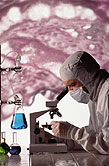
WEDNESDAY, Dec. 21 (HealthDay News) — Mutations in a gene called DICER are associated with rare, seemingly unrelated ovarian, uterine and testicular cancers, a new study finds.
The Canadian researchers said they were surprised to discover that the same fundamental mutation in the DICER gene was the common process underlying all these different cancers.
The study was published in the Dec. 21 issue of the New England Journal of Medicine.
“DICER is of great interest to cancer researchers,” team leader Dr. David Huntsman, a genetic pathologist and director of the Ovarian Cancer Program of B.C. at the British Columbia Cancer Agency and Vancouver Coastal Health Research Institute, said in a University of British Columbia news release.
“There have been nearly 1,300 published studies about it in the last 10 years, but until now, it has not been known how the gene functions in relation to cancer,” said Hunstman, who is also a professor in the departments of obstetrics and gynecology, and pathology and laboratory medicine at UBC.
This new finding could lead to breakthroughs for treatments of more common cancers, according to the researchers.
“Studying rare tumors not only is important for the patients and families who suffer from them but also provides unique opportunities to make discoveries critical to more common cancers — both in terms of personalized medicine, but also in applying what we learn from how we manage rare diseases to more common and prevalent cancers,” Huntsman explained.
“The discovery of the DICER mutation in this varied group of rare tumors is the equivalent of finding not the needle in the haystack, but rather the same needle in many haystacks,” he added.
More information
The U.S. National Cancer Institute has more about cancer research.

